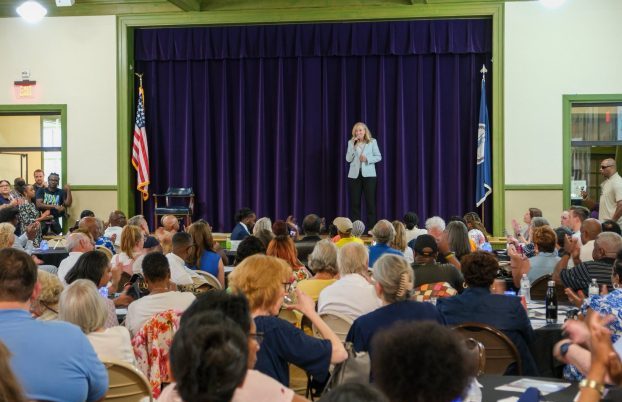Teachers Light Their Hair On Fire
Published 5:33 pm Tuesday, November 13, 2012
Although Rafe Esquith's students often score in the top one percent of standardized tests, he boldly proclaimed to a full Jarman Auditorium that, “I don't care about the tests at the end of the year.” He clarified that although he believes in assessing children, he reminds them if they do not perform well they will simply have to go back over the material. They are not going to burn in hell. Their mothers will still love them and so will he. What Esquith said he did care about was “giving the kids a set of skills that they internalize and that they use for the rest of their lives.”
Dr. Amy Griffin, superintendent of Cumberland Public Schools, introduced Esquith to local teachers and administrators during the Region Eight Forum: Revolutionizing Education on November 6. She stated that for 20 years he has taught fifth-grade at Hobart Elementary School in a neighborhood plagued by guns, gangs and violence. She went on to say that most of his students are immigrants or children of immigrants, living in poverty and learning English as a second language. However, they voluntarily come to class at 6:30 in the morning and besides learning math, reading and science, they play Vivaldi and perform Shakespeare, many going on to attend the best universities in the nation.
He was introduced with a long list of recognitions and achievements by Dr. Griffin. She stated that Esquith is the only teacher to be awarded the president's National Medal of the Arts, has received the National Teacher of the Year Award, written the bestselling Teach Like Your Hair's On Fire and won accolades from Queen Elizabeth II, the Dalai Lama and Oprah.
However, Esquith began by apologizing that the audience had to listen to such a long list of awards, stating, “The only thing I am proud of is I am in my thirtieth year as a public school classroom teacher.” He went on to say that he would be back in Los Angeles late that evening preparing for parent conferences the next day.
The majority of Esquith's talk was focused on student behavior and the three foundational principles of his classroom. First, he believes that he is the role model for his students and that no matter what he says they will mirror what he does. He wants to always demonstrate two things to them: be nice and work hard. Second, Esquith always tries to consider the point of view of the child. Finally, he teaches his students six levels of moral development, his goal being to help them reach level six, when they will do something not to avoid punishment, gain reward or please others, but because they have a personal code of behavior. He hopes to show his students through literature, film and life what level six behavior looks like.
Esquith also spoke about the role of assessment, the need for music and the arts in the classroom and how teachers could get away with taking more risks in their classrooms. He encouraged teachers to take something that they are personally passionate about and use it to teach, using the example of his own classroom. Esquith loves Shakespeare and has learned how to introduce his plays to his students who are now known as the Hobart Shakespeareans. They perform one Shakespeare play a year that is also interspersed with musical performances of contemporary pop and rock songs.
While introducing the speaker, Dr. Griffin clarified the goal of the Region Eight Forum. She said it was planned because “we want to make sure that just because we're small school divisions with limited budgets, that our staff development is quality …Small divisions have to get together and work together, so we can have what everyone else has.”
The Virginia Department of Education Region Eight is made up of 12 counties located in south central Virginia. The forum was funded by Region Eight and offered in conjunction with Longwood University. More than 1,600 teachers and administrators were scheduled to attend the event.
Originally only one session was planned, but increased response from local schools led to the addition of a second talk.
Representatives from all 12 counties attended the forum, as well as some Longwood students, with the bulk being from schools that had closed for professional development that day, such as Nottoway, Amelia, Cumberland and Prince Edward. After listening to Esquith, teachers and staff returned to their schools to continue processing what they had heard.
Teachers from Prince Edward worked interactively via Jabber with Tony Wagner. Wagner is a Harvard professor and former high school teacher who has served as a senior advisor to the Bill & Melinda Gates Foundation. He discussed with teachers the need for play, passion and purpose to keep students' attention, as well as how to help students demonstrate what they know and use their knowledge in innovative ways.
Dr. Christine Ross, a Cumberland School Board member, was very enthusiastic about Dr. Griffin coordinating Esquith to speak at the forum, stating, “If you have lost your spark of teaching, there is no way you can listen to this man and not have it rekindled.”
During the November school board meeting, Dr. Ross commended Dr. Griffin for being a leader not just in Cumberland, but for the entire region. She went on to say that, “I really don't feel that our children, or our teachers, should be penalized for making decisions to be in rural school systems…All of our children should be able to have the exact same opportunities as if I lived in a Henrico or a Chesterfield or a Fairfax, both academically and extra-curricular.”
Cumberland School Board Chairman Ginger Sanderson attended the forum and later reported to the board that, “If we can work to make those students understand his principles, then we will have succeeded as a society.”
During her introduction of Esquith, Dr. Griffin said she had heard Esquith speak at a forum in Richmond last year. She admitted that she was feeling “down about public education,” but after hearing Esquith, she left “uplifted, feeling that we can all make a difference, no matter what barriers we see.” She then began to try to figure out how she could help her local colleagues hear his message.






